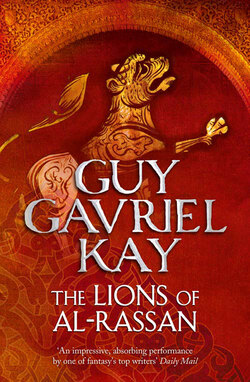Читать книгу The Lions of Al-Rassan - Guy Gavriel Kay - Страница 9
PROLOGUE
ОглавлениеIt was just past midday, not long before the third summons to prayer, that Ammar ibn Khairan passed through the Gate of the Bells and entered the palace of Al-Fontina in Silvenes to kill the last of the khalifs of Al-Rassan.
Passing into the Court of Lions he came to the three sets of double doors and paused before those that led to the gardens. There were eunuchs guarding the doors. He knew them by name. They had been dealt with. One of them nodded slightly to him; the other kept his gaze averted. He preferred the second man. They opened the heavy doors and he went through. He heard them swing closed behind him.
In the heat of the day the gardens were deserted. All those still left within the dissolving magnificence of the Al-Fontina would have sought the shade of the innermost rooms. They would be sipping cool sweet wines or using the elaborately long spoons designed by Ziryani to taste sherbets kept frozen in the deep cellars by snow brought down from the mountains. Luxuries from another age, meant for very different men and women from those who dwelt here now.
Thinking such thoughts, ibn Khairan walked noiselessly through the Garden of Oranges and, passing through the horseshoe arch, into the Almond Garden and then, beneath another arch, into the Cypress Garden with its one tall, perfect tree reflected in three pools. Each garden was smaller than the one before, each heartbreaking in its loveliness. The Al-Fontina, a poet once had said, had been built to break the heart.
At the end of the long progression he came to the Garden of Desire, smallest and most jewel-like of all. And there, sitting quietly and alone on the broad rim of the fountain, clad in white, was Muzafar, as had been prearranged.
Ibn Khairan bowed in the archway, a habit deeply ingrained. The old, blind man could not see his obeisance. After a moment he moved forward, stepping deliberately on the pathway that led to the fountain.
“Ammar?” Muzafar said, hearing the sound. “They told me you would be here. Is it you? Have you come to lead me away from here? Is it you, Ammar?”
There were many things that could be said.
“It is,” said ibn Khairan, walking up. He drew his dagger from its sheath. The old man’s head lifted suddenly at that, as if he knew the sound. “I have, indeed, come to set you free of this place of ghosts and echoes.”
With the words he slid the blade smoothly to the hilt in the old man’s heart. Muzafar made no sound. It had been swift and sure. He could tell the wadjis in their temples, if it ever came to such a thing, that he had made it an easy end.
He laid the body down on the fountain rim, ordering the limbs within the white robe to allow the dead man as much dignity as could be. He cleaned his blade in the fountain, watching the waters swirl briefly red. In the teachings of his people, for hundreds and hundreds of years, going back and away to the deserts of the east where the faith of the Asharites had begun, it was a crime without possibility of assuaging to slay one of the god’s anointed khalifs. He looked down at Muzafar, at the round, wrinkled face, sadly irresolute, even in death.
He has not been truly anointed, Almalik had said, back in Cartada. All men know this.
There had been four puppet khalifs this year alone, one other here in Silvenes before Muzafar, one in Tudesca, and the poor child in Salos. It was not a situation that could have been allowed to continue. The other three were already dead. Muzafar was only the last.
Only the last. There had been lions once in Al-Rassan, lions upon the dais in this palace that had been built to make men fall to their knees upon marble and alabaster before the dazzling evidence of a glory beyond their grasp.
Muzafar had, indeed, never been properly anointed, just as Almalik of Cartada had said. But the thought came to Ammar ibn Khairan as he stood in his twentieth year in the Garden of Desire of the Al-Fontina of Silvenes, cleansing his blade of a man’s red blood, that whatever else he did with his life, in the days and nights Ashar and the god saw fit to grant him under the holy circling of their stars, he might ever after be known as the man who slew the last khalif of Al-Rassan.
“You are best with the god among the stars. It will be a time of wolves now,” he said to the dead man on the fountain rim before drying and sheathing his blade and walking back through the four perfect, empty gardens to the doors where the bribed eunuchs waited to let him out. On the way he heard one foolish bird singing in the fierce white light of midday, and then he heard the bells begin, summoning all good men to holy prayer.
